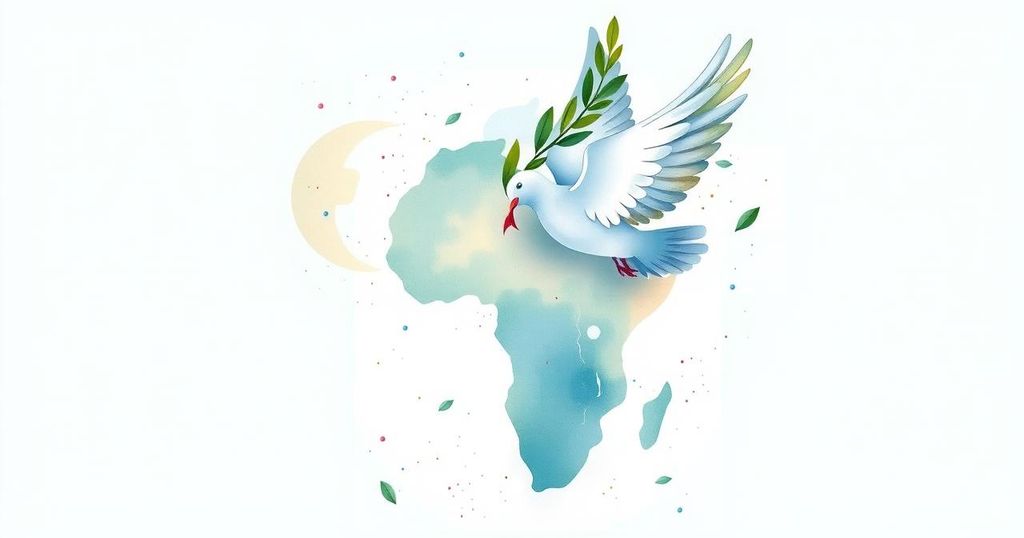Trump Announces Peace Treaty Between Congo and Rwanda, Calls it Great Day for Africa

On June 21, President Trump announced a peace treaty between Congo and Rwanda, marking the end of a long-standing conflict. He criticized the Nobel Peace Prize committee for not recognizing his peace efforts globally and indicated a decision on U.S. action against Iran would come soon. Ongoing tensions between Israel and Iran are escalating, potentially affecting international trade and oil prices.
In a notable development, US President Donald Trump announced that he has mediated a peace treaty between the Democratic Republic of the Congo and Rwanda, which has concluded a long-standing conflict marked by considerable violence. This significant announcement, made via his social media platform Truth Social on Saturday, was portrayed by Trump as a historic moment for Africa and beyond.
The president noted, “I am very happy to report that I have arranged, along with Secretary of State Marco Rubio, a wonderful Treaty between the Democratic Republic of the Congo, and the Republic of Rwanda, in their War, which was known for violent bloodshed and death.” He further emphasized that a signing ceremony is set to occur on Monday in Washington, which he heralded as a “Great Day for Africa and, quite frankly, a Great Day for the World!”
Expanding on this topic, Trump criticized the Nobel Peace Prize committee, lamenting the lack of recognition for his various global peace efforts. “I won’t get a Nobel Peace Prize for this… but the people know, and that’s all that matters to me!” Trump claimed, referencing his involvement in conflict resolution efforts involving India, Pakistan, and the Middle East, among others.
In related news, the White House Press Secretary Karoline Leavitt indicated that Trump is expected to make a crucial decision regarding the U.S. approach to Iran in the coming weeks. She mentioned that Trump was addressing speculation about U.S. involvement in the strife between Iran and Israel, stating, “Based on the fact that there’s a substantial chance of negotiations… I will make my decision whether or not to go within the next two weeks.”
The dialogue between the U.S. and Iran appears to be ongoing, although details on the nature of these discussions are murky. Leavitt stressed that any agreement with Iran would require full compliance regarding them refraining from nuclear enrichment, ensuring they cannot develop nuclear weapons.
Amid these developments, Trump remained vague about potential military actions against Iran, saying, “I may do it, I may not do it. I mean, nobody knows what I’m going to do.” He further voiced his grievances against Iran, urging them to have engaged in dialogue sooner to avoid escalating destruction.
Compounding the situation, tensions between Israel and Iran have intensified following Israeli strikes against Iranian targets, leading to a cycle of retaliation. An analysis by Al Jazeera highlighted Iran’s diminished support from groups like Hezbollah, which could complicate its deterrence strategies against Israeli actions.
As the situation evolves, the implications of this conflict could resonate globally, particularly if Iran follows through on threats that could disrupt shipping in the Strait of Hormuz, a critical maritime route which could, in turn, spike oil prices and trigger wider economic repercussions.
In summary, President Trump’s recent announcement regarding a peace treaty between Congo and Rwanda marks a significant moment in African diplomacy. However, ongoing tensions with Iran and various conflicts around the world illustrate a complicated landscape for U.S. foreign policy. Trump’s blunt commentary and criticisms suggest he is acutely aware of the challenges ahead, especially as he navigates complex geopolitics with various nations. As developments unfold, the global community will be watching closely to see how these situations are resolved and their potential impact.
Original Source: www.tribuneindia.com








